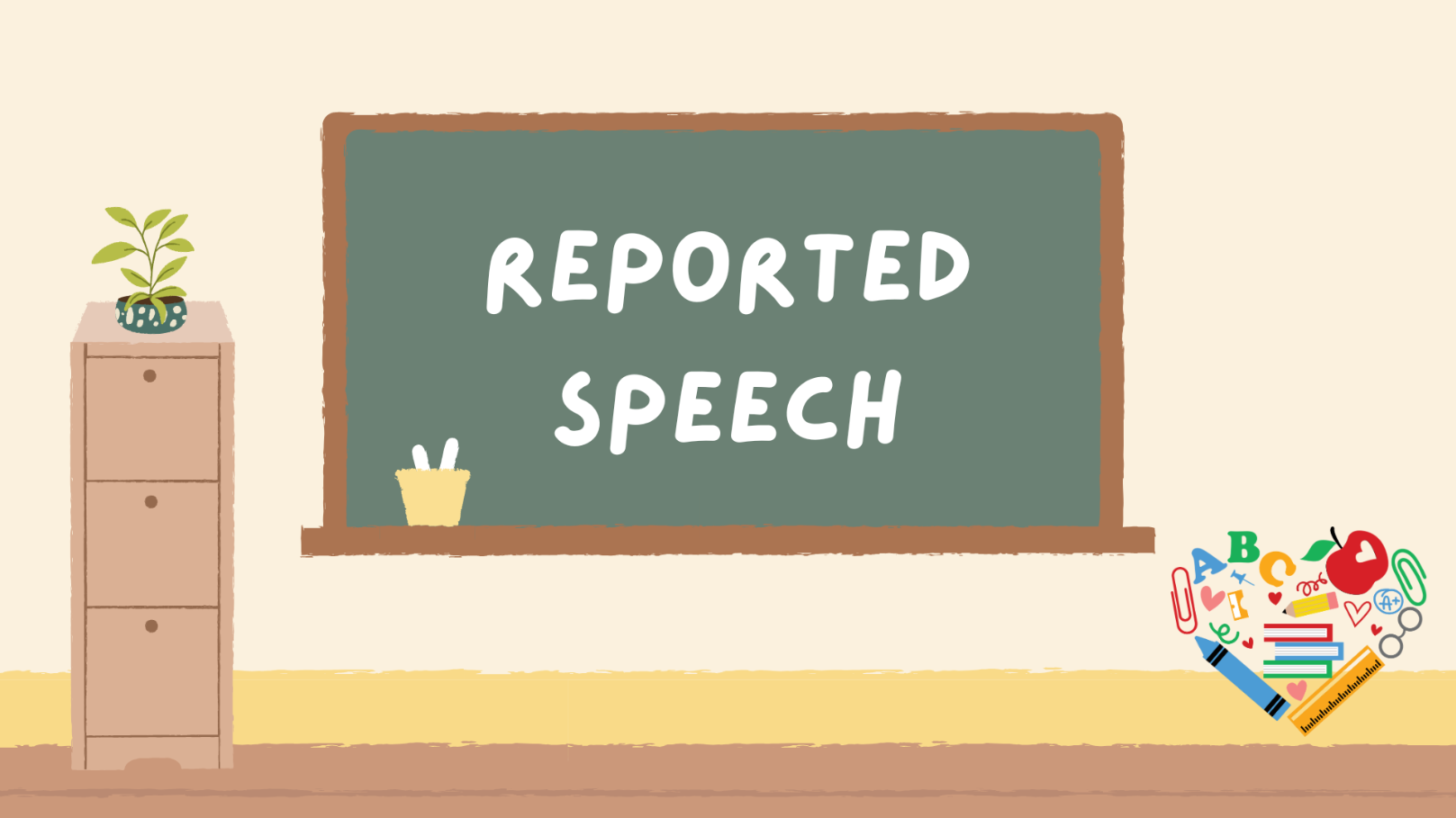How Is Reported Speech Formed in English?
Oleksandra Kulish
Book expert
Reported speech — is retelling someone else's words without exact quoting. In Russian, this way of conveying statements is called indirect speech. But it is no coincidence that in English this topic is studied separately: to use indirect speech correctly, you need to know a number of nuances.
In our article, we explain how indirect speech is formed in English: how to retell fresh gossip to a friend or tell a friend what the news announcer said in the latest broadcast, using reported speech.

What is indirect speech in English: basic rules
First, let's consider the key concepts. Direct speech (direct speech) — these are the exact words said by someone. They are always put in quotation marks, and a colon is placed before them.
- She says: «I like coffee». — She says: «I like coffee».
Indirect speech (indirect speech) is conveyed not literally, but through a subordinate clause. Quotation marks and a colon are not needed here.
- She said that she liked coffee. — She said that she likes coffee.
How to correctly construct a sentence by turning direct speech into indirect? Here are the basic rules:
- After introductory words, we add the conjunction that. Although this is a rule, it can be omitted — it is not considered a mistake. That is, indirect speech is sometimes used without that.
- In the main clause, the tense remains unchanged, and in the subordinate clause, the «step back» rule (sequence of tenses) is applied. This means that the tense in indirect speech shifts one step back in the past compared to direct speech.
- The verb to say is replaced with to tell if it fits better in meaning (for example, when indicating to whom exactly something is said).
A visual table will help you construct sentences.
|
Sentence type |
Direct speech |
Indirect speech |
Explanation |
|
Statement |
“I am happy,” she said. |
She said that she was happy. |
am → was (tense change) |
|
Question (general) |
“Do you like pizza?” |
He asked if I liked pizza. |
do → liked, conjunction if |
|
Question (special) |
“Where is the station?” |
He asked where the station was. |
No if, direct word order |
|
Command / request |
“Close the door, please.” |
He asked me to close the door. |
Verb → to + V1 |
|
Prohibition |
“Don’t touch the painting.” |
He told me not to touch the painting. |
not to + V1 construction |
Indirect Speech and Sequence of Tenses
The main rule for forming direct speech from indirect speech — is the sequence of tenses. In a subordinate clause, the tense always shifts one step back in the past (the «step back» rule), except for exceptions (see below).
Let's illustrate the scheme with examples:
Present Simple → Past Simple
Direct:
Tom said: «I play football every weekend».
→ Tom said: «I play football every weekend».
Indirect:
Tom said that he played football every weekend.
→ Tom said that he played football every weekend.
Present Continuous → Past Continuous
Direct:
Anna said: «I am cooking dinner now».
→ Anna said: «I am cooking dinner now».
Indirect:
Anna said that she was cooking dinner then.
→ Anna said that she was cooking dinner then.
Present Perfect → Past Perfect
Direct:
They said: «We have just finished the report».
→ They said: «We have just finished the report».
Indirect:
They said that they had just finished the report.
→ They said that they had just finished the report.
Present Perfect Continuous → Past Perfect Continuous
Direct:
Kate said: «I have been learning Spanish for six months».
→ Kate said: «I have been learning Spanish for six months».
Indirect:
Kate said that she had been learning Spanish for six months.
→ Kate said that she had been learning Spanish for six months.
Past Simple → Past Perfect
Direct:
Mike said: «I saw a great film yesterday».
→ Mike said: «I saw a great film yesterday».
Indirect:
Mike said that he had seen a great film the day before.
→ Mike said that he had seen a great film the day before.
Past Continuous → Past Perfect Continuous
Direct:
She said: «I was reading when you called».
→ She said: «I was reading when you called».
Indirect:
She said that she had been reading when I called.
→ She said that she had been reading when I called.
Sequence of tenses table for clarity.
|
Direct Speech |
→ |
Indirect Speech |
|
Present Simple |
→ |
Past Simple |
|
Present Continuous |
→ |
Past Continuous |
|
Present Perfect |
→ |
Past Perfect |
|
Present Perfect Cont. |
→ |
Past Perfect Continuous |
|
Past Simple |
→ |
Past Perfect |
|
Past Continuous |
→ |
Past Perfect Continuous |
|
yesterday |
→ |
the day before |
|
now |
→ |
then |
|
today |
→ |
that day |
Sentences in Indirect Speech: Future Simple
It's simple: will is always replaced by would — this is the future in the past. Here is an example:
Direct:
Anna said: «I will visit Paris next summer».
→ Anna said: «I will visit Paris next summer».
Indirect:
Anna promised that she would visit Paris the following summer.
→ Anna promised that she would visit Paris the following summer.
How to Translate Modal Verbs in Indirect Speech
Do not rush to shift all modal verbs «one step back». Some change, others remain unchanged.
Modal verbs that change:
|
Direct Speech |
→ |
Indirect Speech |
|
can |
→ |
could |
|
may |
→ |
might |
|
must |
→ |
had to |
|
will |
→ |
would |
|
have/has to |
→ |
had to |
|
can’t |
→ |
couldn’t / wouldn’t be able to |
Modal verbs that do not change:
- need;
- had to;
- had better;
- should;
- would;
- could;
- might;
- ought to.
For negation: didn’t need to, didn’t have to, wouldn’t have to.
Examples:
|
Modal |
Direct Speech |
Indirect Speech |
|
can → could |
Tom said: «I can drive a car». → Tom said: «I can drive a car». |
Tom said that he could drive a car. → Tom said that he could drive a car. |
|
may → might |
She said: «You may leave early today». → She said: «You may leave early today». |
She said that I might leave early that day. → She said that I might leave early that day. |
|
have to → had to |
He said: «I have to finish this project by Friday». → He said: «I have to finish this project by Friday». |
He said that he had to finish that project by Friday. → He said that he had to finish that project by Friday. |
|
would / could (do not change) |
Kate said: «It would be great if I could travel more». → Kate said: «It would be great if I could travel more». |
Kate said that it would be great if she could travel more. → Kate said that it would be great if she could travel more. |
|
needn’t → didn’t need to |
Max said to me: «You needn’t worry about the test». → Max said to me: «You needn’t worry about the test». |
Max told me that I didn’t need to worry about the test. → Max told me that I didn’t need to worry about the test. |
Replacement of pronouns, adverbs of time and place
In some cases, when forming indirect speech, it is necessary not only to add the word that, but also to change the pronoun. There is no strict rule here — the pronoun changes depending on the meaning. Example:
Billy says, «I am learning Spanish».
– Billy says: «I am learning Spanish».
Billy says that she is learning Spanish.
– Billy says that she is learning Spanish.
Replacement table:
|
Direct Speech |
→ |
Indirect Speech |
|
here |
→ |
there |
|
this |
→ |
that |
|
these |
→ |
those |
|
now |
→ |
then |
|
today |
→ |
that day |
|
yesterday |
→ |
the day before |
|
tomorrow |
→ |
the next day / the following day |
|
last week |
→ |
the previous week |
|
next week |
→ |
the following week |
|
ago |
→ |
before |
Interrogative Sentences in Indirect Speech
Questions in indirect speech have a normal word order, and instead of a question mark at the end, a period is used. Yes/no questions are introduced by the conjunctions if or whether (meaning "whether"), while the auxiliary verbs do/did are omitted. Wh-questions retain the question words.
Important! If there is a short yes/no answer in direct speech, in indirect speech it is replaced with that.
Examples of questions in indirect speech:
He asks me, «Did you finish your homework?» — He asks me: «Did you finish your homework?»
→ He asks me if I have finished my homework. — He asks me whether I have finished my homework.
Maria asked, «Where did you put my notebook?» – Maria asked: «Where did you put my notebook?»
→ Maria asked where I had put her notebook. – Maria asked where I had put her notebook.
John answered, «I forgot to call you yesterday.» — John answered: «I forgot to call you yesterday.»
→ John answered that he had forgotten to call me yesterday. — John answered that he had forgotten to call me yesterday.
Sophie asks, «Can you help me with this problem?» — Sophie asks: «Can you help me with this problem?»
→ Sophie asks if I can help her with this problem. — Sophie asks whether I can help her with this problem.
If the verb ask (or similar) is in the present or future tense, the tense in the subordinate clause does not change. If it is in the past tense, the sequence of tenses rule applies.

Imperative Mood and Indirect Speech
In sentences with the imperative mood, verbs such as tell, order, ask are usually used. To convey them in indirect speech, the infinitive with the particle to replaces the imperative form. Demonstrative pronouns, adverbs of time and place from direct speech are replaced with words that better fit the new context.
Attention: the verb say is not used in indirect speech. Instead, use ask (or others depending on the tone).
For example:
The teacher said to the student: «Open the textbook on page 45». (The teacher said to the student: “Open the textbook on page 45.”)
→ The teacher told the student to open the textbook on page 45. (The teacher told the student to open the textbook on page 45.)
And how to convey negation? Add the particle not before the infinitive.
The doctor said: «Don’t drink cold water after the workout». (The doctor said: “Don’t drink cold water after the workout.”)
→ The doctor advised not to drink cold water after the workout. (The doctor advised not to drink cold water after the workout.)
To avoid repeating tell and ask, use introductory verbs: advise, warn, remind, beg, command, forbid, etc. They help convey the emotion and tone of direct speech more accurately.
Exceptions to the Rules
As is known, there are no rules without exceptions. This applies to the rules of indirect speech in English. Below are all the exceptions worth knowing.
1. If the subordinate clause expresses a well-known fact or truth. Example:
- Teacher said, «Water boils at 100 degrees Celsius».
- Teacher said that water boils at 100 degrees Celsius.
– The teacher said that water boils at 100 degrees Celsius.
2. If the sentence contains modal verbs must, should, ought to. Example:
- John said he must finish the project today.
– John said that he must finish the project today.
3. When it is about a specific event that happened at a certain time and did not repeat. Example:
- Our teacher told that the first man landed on the Moon in 1969.
– Our teacher said that the first man landed on the Moon in 1969.
4. If the subordinate clause contains the conjunctions when/since and the simple past tense is used, which does not change its form. Example:
- I said that I hadn’t seen that movie since we watched it last Christmas.
– I said that I hadn’t seen that movie since we watched it last Christmas.
5. If Past Perfect or Past Perfect Continuous is used in direct speech, it does not change when converted into indirect speech. Example:
- They said, «We had been studying all night when the power went out».
– They said, «We had been studying all night when the power went out». - They said that they had been studying all night when the power went out.
– They said that they had been studying all night when the power went out.
6. Reference to a well-known fact (still relevant or undisputed). Example:
- She said that the train leaves at 8 a.m.
– She said that the train leaves at 8 a.m.
To correctly construct indirect speech in English, remember the following features:
- Change verb tenses, but do not forget about exceptions.
- Remember the rules for translating modal verbs.
- Change pronouns according to the context.
- Study the table with adverbs of time and place.
These are all the main rules regarding how indirect speech is constructed in English. Read quality educational literature from Dinternal Education to improve your level of knowledge, and success in learning will surely await you.









